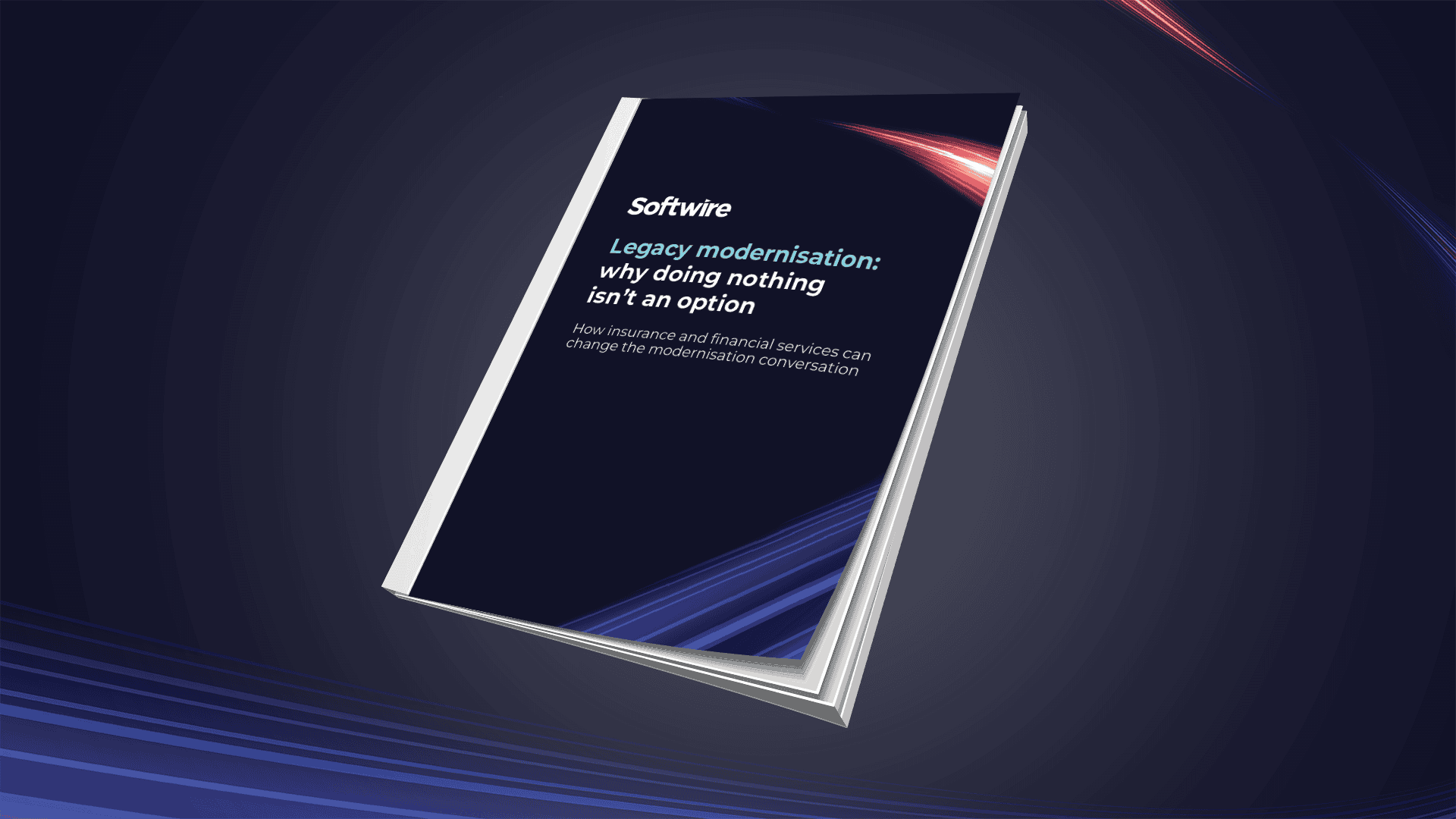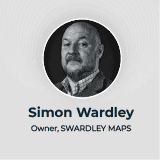“I think when a conference does its job well, when you can open people’s minds with new content or even old ideas, but well-delivered, I believe that they become more open to ideas, but they also become more open to people.” – Herb Kim
Back in 2008, Herb Kim founded the Thinking Digital conference series. Little did he know that 15 years on, the event would still be going, having established itself as a popular fixture in the north-east tech calendar.
Herb joins Zoe Cunningham to talk about the importance of events, both for networking, and as powerful and serendipitous learning and development opportunities for anyone in the sector.
The discussion then moves on to tech leadership, with Herb explaining why he believes putting yourself at risk of genuine personal failure is one of the best ways to learn critical leadership traits.
Listen to the podcast on this page, or wherever you get your podcasts, and read the transcript below.
You can discover more about Thinking Digital Conference, including the 2024 dates, on the event website.
***
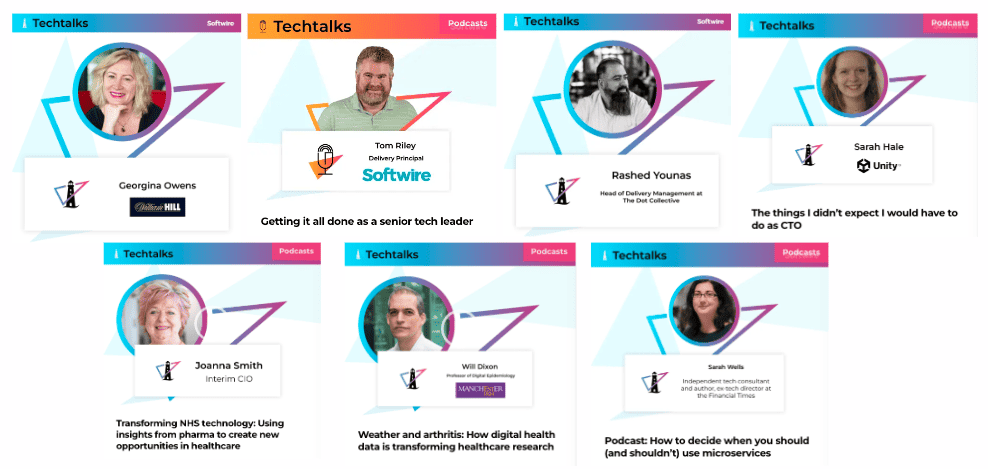
Digital Lighthouse is our industry expert mini-series on Softwire Techtalks; bringing you industry insights, opinions and news impacting the tech industry, from the people working within it.
Transcript: Softwire TechTalks: Herb Kim – Why you need to risk failure to become a great leader
[music]
Zoe Cunningham: Hello, and welcome to the Digital Lighthouse. I’m Zoe Cunningham.
On the Digital Lighthouse, we get inspiration from tech leaders to help us shine a light through turbulent times. We believe that if you have a lighthouse, you can harness the power of the storm.
Today, I’m super-excited to welcome Herb Kim, who is founder and CEO of Thinking Digital. Hello, Herb, and welcome to the Digital Lighthouse.
Herb Kim: Hi, Zoe. Thank you for the invite. Great to see you.
Zoe: You are so welcome. Can you tell us a bit about what it is that you do right now and also the journey that you’ve been on to get to where you are?
Herb: Okay, cool. Today I’m really best known for producing and curating and directing a number of thought leadership conferences all based up in the north, between Newcastle, Durham, Manchester, Sheffield, and Liverpool.
My journey, I guess, is an unusual one in the sense… You can probably tell from the accent, I’m not very Geordie or Mancunian. I was born in Brooklyn to Korean parents. I was raised in America, I was educated there, and I got my MBA in Philadelphia.
I did a semester at London Business School, and that started my UK journey, in a sense, in that I did a year working at the internet division of IBM after I graduated in 1996, right at the dawn of what you might call the ‘modern internet’.
Basically, through a long story, I was invited to join Blackwell’s, the UK publisher and bookstore chain, to help set up their first internet bookshop. This would’ve been back in ’97, and that’s what got me here. That was the beginning of the first dot-com boom or bubble, depending on which way you want to describe it. I [then] went to work for a big German publisher, doing basically the same thing.
Then I went to work for a couple years for what used to be called BT Cellnet, now O2, and it was from there that, again, and all over the long story, I got invited to set up a not-for-profit economic development company in Newcastle to seek to develop and hothouse the burgeoning tech digital sector in the north-east of England. This would’ve been 2002. I arrived in October 2002 on, I like to joke, Geordie shores.
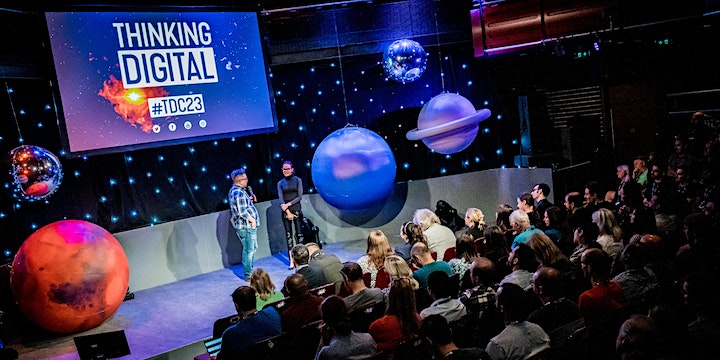
Through that, we were looking for a big project to advance our goals there. It was around that time that I discovered something called TED, and their first ever international conference called TEDGlobal, back in 2005 in Oxford. I found a way to get to the TED main conference, which was still back then in Monterey, California, and had, in short, a life-changing experience.
I came back inspired to try and do our own version of TED. There was no TEDx program at the time, and we were jokingly calling this project codename ‘Geordie TED’. Because there was no TEDx program – which probably would’ve just simply set up a TEDx Newcastle-style event – we created something called Thinking Digital.
The first one ran in 2008. If I’m honest, [it] nearly destroyed the company, because it was so much more complicated and frankly expensive to put on than we ever could have realised, but we survived.
By the second one, people started to get the concept. Of course, we were doing a TED-inspired event without… there were no TED talks at the time. There was no TEDx events at the time.
Zoe: Right. You couldn’t use the name. You were like, “It’s like this, but we can’t say that.”
Herb: Exactly. We had to just trust that through enough promotion to try and convince people on the quality of the content, that they would come. And eventually, they did.
Here we are 15 years later, obviously, we couldn’t run an event during COVID, but we just did the 14th Thinking Digital in that time. It’s still going strong, fortunately, and it’s still a joy to produce.
Zoe: Oh, well, congratulations. I think it’s really interesting to hear people’s backgrounds, because I think it’s easy to look around and see, “Oh, that person’s doing something cool. How do I get to do that?”
Everyone’s roots are always so different. Hearing your journey, I can hear the links between publishing and the getting ideas out through books. And this is the same premise, it’s just now we have a lot more ways to share ideas and get people excited about things.
I’d love to touch on, as well, you mentioned that you grew up in the States. How was your experience there compared to your experience in Newcastle?
Herb: I really loved growing up in America, but what’s interesting for me is I was in London before Newcastle, and I’m fairly convinced that had I not left London and come to a place like Newcastle, I probably would’ve gone back home by now. I think what Newcastle gave me, relative to London (and I think probably the same thing is true if I had been living in New York – I probably would’ve moved out of New York by now), is that Newcastle, for me, or Manchester or Liverpool, the other northern cities that I’ve worked in…
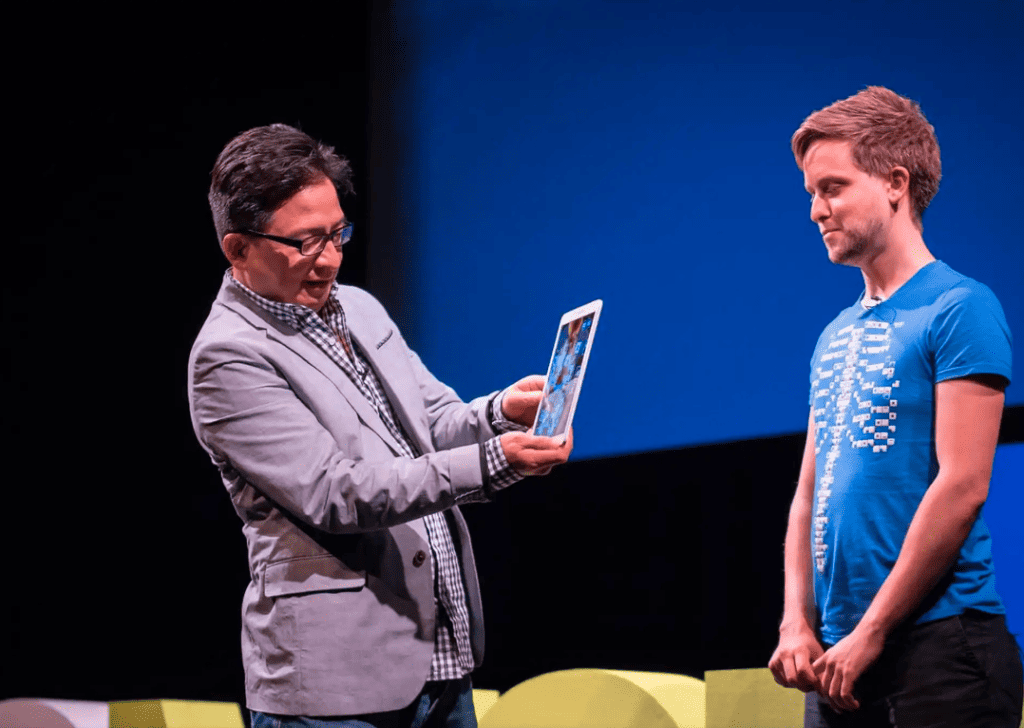
I’ve been lucky because, I know that the recent history of those cities are part of what used to be called “It’s Grim Up North.” Those cities obviously went through quite a big transition from their industrial past into their current iterations. I’ve been lucky enough, frankly, to probably miss out on some of the tougher parts. I know Softwire has got a brand-new office in Manchester, which is how I became connected to you, and others.
We hosted a talk recently, where they talked about how Manchester, the city centre, literally had hundreds of people as official residents. It’s just shocking today how it’s changed. We talked before, you’re located near the King’s Cross St Pancras area [in London], and that area has changed dramatically as well, of course.
Anyways, getting back to your original question, I think what Newcastle’s given me, it’s become a contemporary modern city affording me a lot of the cultural and commercial benefits of being in an urban centre.
It’s obviously less expensive, less intense, probably friendlier. Hence, in many ways, it’s more of an American city in many ways relative to the south-east. That’s not to be, in any way, anti-London or anti-south-east, it’s just they’re different. I think anyone would acknowledge they are different.
For me, it reminds me a lot of living in lots of other parts of America that I’ve been lucky enough to benefit from. The thing is, I think life up north, in many ways, reminds me a lot of living in more suburban areas, particularly in America. Hence perhaps why I’ve been here for so long, and living here very comfortably, with no plans on moving elsewhere.
Zoe: Maybe it’s quite a nice thought that, actually, the differences between countries are not so big as the differences between different parts of a country. Like you say, we’ve just opened an office in Manchester and we are seeing exactly what you say, because it’s smaller, it’s friendlier, it’s easier to connect to people.
London’s great in many ways, but it’s also… you get lost in how big it is. I feel like, in Manchester, it’s easy to get involved in the tech scene. In London, there isn’t really even one tech scene, because there’s so many different parts of London and different groups within London. That’s really cool to hear that that’s similar elsewhere as well as in the UK.
Herb: Yes. I think you’re absolutely right, which is that I think people, especially during 2016, there was that term, was it ‘flyover country’ in America? We all had what we were calling the metropolitan elites of coastal California and the coastal East Coast, and the middle of America, which is obviously vast in geographic size.
I don’t know, maybe there’s similar parallels along those lines to the UK, where I think there’s this idea that someone that lives and breathes Manhattan, will be probably more comfortable in, say, London, than they would be in, I don’t know, Omaha, Nebraska. No offense to Omaha, Nebraska.
Certainly, for me, the idea that I would be able to move to a small city like Newcastle, or just in northern England – because I do genuinely work across all those cities – and find it as easy as working in Boston or in San Diego, and these sorts of places. I wouldn’t have guessed that, but it’s been very much true.
Zoe: I’d love to pick up on something you mentioned earlier. How is it that the conference environment or the event environment helps people to consume information and learning? What’s your experiences, I guess, contrasting as well with your experiences in publishing?
Herb: Well, I think one thing is just simply there are all of these different ways of getting access to information. Just in the same way that some people prefer reading books or watching videos on YouTube or…
Zoe: …Listening to a podcast…
[laughter]
Herb: …Listening to a podcast or being in a conference environment, they’re just different. People do, genuinely, as you know, learn in different ways, and also depending on the material, context will obviously matter greatly.
I think conferences probably benefit in two ways. One is the ability to impart some emotional impact to the material. Obviously, the presence of other people is usually, hopefully, a positive factor.
I just see them as a continuum of different ways of oftentimes doing the same thing. Because obviously books have changed people’s lives, and I think attending an amazing conference has done the same thing, but to different people perhaps in different ways.
Zoe: I think it’s definitely true that some people seem to learn better than other people, and they seem to be able to take on more information and maybe grow more quickly. Have you got any thoughts on what contributes to that? What is it that helps people learn and grow and absorb more information?
Herb: Going back to the discussion on the conference specifically, I think one of the things the conference can give is serendipity. I’m not trying to overly promote Softwire here, but I was invited to a Softwire launch event in Manchester back in October-time, where I got to learn about something I’d never heard of before, called the large language model. Now, of course, everyone knows about it. Well, not everyone, but certainly there’s a much wider appreciation for what a large language model is.
That is something that is a lovely facet about a conference: oftentimes you are exposed to things that, if it was left solely up to you, you wouldn’t have checked out. Obviously, large language models had already entered the [world of]tech. I just chose to not really pay much attention to it until Softwire decided to curate a bit of content via one Sean Williams – who I’m sure you’re familiar with – and blew my mind, as obviously he and others have been proceeding to do in the time since then.
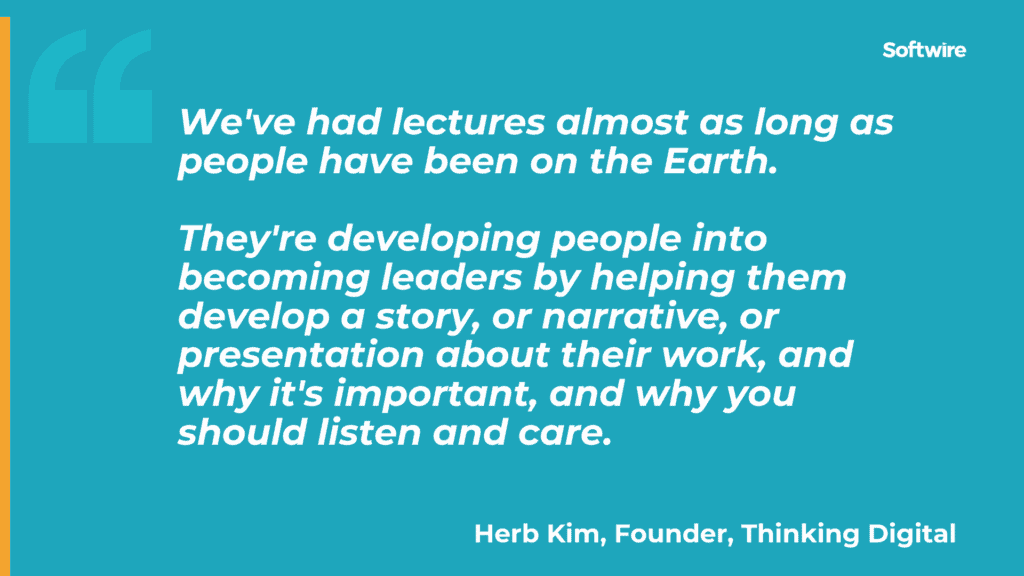
I think when a conference does its job well, and particularly for an audience especially in the tech world that maybe trends more introvert than perhaps, say, a sales conference or things like that, is that when you can open people’s minds with new content or even old ideas, but well-delivered, I believe that they become more open to ideas, but they also become more open to people.
Those same people in the same room, some of whom may go on to become best friends. Hopefully, I’ll continue communicating and collaborating with Sean for years to come. [But without the prompt of the event, I] would’ve never bothered even making effort because, well, classically speaking, introverts need big ideas in order to make small talk. The extroverts are the opposite. They need small talk in order to get warmed up for bigger conversations.
Zoe: That’s a great quote. I’ve not heard that before. I think that’s really cool.
Herb: I’m not sure if I made that up or someone else said that to me, but regardless, I’m not planning on trademarking it. Until TED, I literally probably hated pretty much every conference or trade show. I used to do a ton of them. I found them exhausting. I found the amount of effort and cost, frankly, on behalf of the company, in terms of what you got out… I didn’t see the value, personally.
For people that are more introvert or ambivert, or whatever expression you want to use, going with a content-heavy approach, and not just sheer volume of content, but obviously, content that’s high quality, where you spend a lot of time in making sure it’s well delivered.
And actually, frankly, paying attention to things like lighting and a bunch of other things that all deliver to helping that content be appreciated by the audience. That warms up a very different kind of audience. That’s something that I’ve learned, and it just depends on the audience that you’re working with.
Zoe: That’s super-interesting. I’d like to delve into that a bit more because I think that one of the reasons people listen to podcasts, in particular, similarly to conferences, is that you are trying to improve yourself. You’re trying to learn some ideas so that you can do something in your life better, usually your job.
On my journey to become a leader, I consumed a lot of content, trying to develop myself as a leader and to try and get a list of leadership skills that would make everything super-easy all the time. I just wondered if you have any top things you’d want to share with people on that leadership journey?
Herb: Well, the classic thing is that these conferences are a lot harder to do than they look. Even after years on, there’s a desire to try and get more comfortable and relaxed and make it easier, and that’s a trap! Maybe I’m doing it wrong, but it seems that they always remain complicated, and trying to get comfortable, trying to make it less stressful in some way, is a fool’s errand.
I would say, though, to some extent, that producing an event is almost like a leadership training event, just because you’re going to put yourself through a lot of stresses. Especially if you’re leading the event, you’re putting your name on the line. We obviously have dramatic examples like Fyre Festival where you can literally go to jail! That’s, admittedly, an extreme example, also involving fraud, so let’s not consider that.
But I think it’s rare to put yourself in front of a group of people and promise them that you’re going to put together an experience that’s worth them taking a day, two days out of their lives. Then for those who venture on stage to do the presenting, that’s a different leadership exercise, and it’s very different from doing a keynote. It’s very different from being in a panel.
For me, it’s taken me a long time, but now I’m at a point where I do coach people on how to do those talks. And I increasingly am coming to a conclusion: we’re not very satisfied, you wouldn’t call this the world’s most contented in history.
I do genuinely think that we’re living through a global leadership crisis. I think there is a confusion – what is the difference between leadership and management? Which is a rhetorical thing I often ask myself and others now.
I think the curse of a well-established company/country, is that eventually management takes over. Why is it that there’s this fascination with startups? If you look at their actual economic impact, it’s like barely a fly.
They command an outsized amount of attention certainly within the tech economy, but even in the broader economy. A handful of sexy startups do get a hell of a lot of media attention. Why would that be?
I think the main difference between the two is simply that, I think, one of the big tasks of a leader is to hold the story, or the narrative, about what this company, this organisation, this country, is about. What are we, and where are we going and why? Why should you care? Why should you want to be part of this thing?
I think any good startup typically doesn’t start with $100 million in financing. They start with nothing typically, or next-to nothing. They have literally no employees, no money, no customers, sometimes no technology. They might have, at best, a PowerPoint presentation. Their story, their narrative, had better be pretty darn attractive on multiple different levels in order to attract investment, employees, partners, ultimately customers, and so on and so forth.
In terms of developing a compelling talk, that is a fundamental act of leadership. Think about it, why is TED popular? We’ve had lectures almost as long as people have been on the Earth. They’re developing people into becoming leaders by helping them develop a story, or narrative, or presentation about their work, and why it’s important, and why you should listen and care.
Zoe: At the same time, providing a service for the people watching, because hearing the story, as well, of a startup, versus hearing the details of the management of a large corporation, these are two very different experiences, aren’t they? I think the point you’re making about when you are a startup, the story is such a larger percentage of your activity, versus once you are a corporate, the story probably is not going to be that different.
Herb: Well, I think that story or narrative is actually a fundamental human need now, and I’ll tell you why. In 2016, we had stories like, ‘We’re going to make America great again.’ ‘We’re going to build a wall.’ ‘We’re putting America first.’ Or ‘350 million a week to the NHS,’ or ‘We’re taking back control.’
I just think that so many people are so desperate for some sort of narrative. Where are we headed as a company, as an organization, as a community? Just give me some direction!
I have to believe that probably a majority of people thought we’re not going to get 350 million to the NHS. ‘I know that’s probably BS, but it’s something to hang onto.’ ‘I know this wall is probably never going to get built but, hey, it’s a narrative. It’s something that, yes, I can get behind. I can believe in something.’
I say this, I was a long-time Hillary Clinton supporter. I donated the federal maximum to both of her campaigns, which is the only campaigns I’ve ever donated to. I was a big believer in it, and frankly, what she has accomplished and certainly her credentials relative to her opponent in 2016, I think were undeniable.
I do remember my mother asking me – she’s been a long-time Republican and we typically avoid these questions – but she would ask me in the most friendly, non-confrontational way possible: ‘I totally accept that she’s more qualified, she’s more experienced, and all that stuff, but what is she actually going to do?’
I remember, [being] about to launch into all my anti-Trump narratives, and I just got hit with a brick wall and I just realized I literally don’t know a single thing that she is putting forward as to what the future of America and her campaign was going to be about. Lo and behold, she lost.
The only thing that I think most people remember about the Remain campaign in the UK was that it was called ‘Project Fear’, which of course wasn’t their branding. Their opponents were so good, they branded them, as well as branding themselves.
My argument is – humble bragging here – I graduated from Princeton for my undergrad in history, and I got my MBA from Wharton in Philadelphia. Two of the, supposedly, greatest leadership training grounds in the world. No offense to them, I had great experiences at both places. I absolutely would love to be able to do them again, but I’ll be honest: I don’t think I learned a single thing about leadership in both of those experiences.
Did I learn a lot about management? Absolutely. Logical reasoning, critical thinking, quantification, all the classic management tools. Management is massively important. Imagine a Boris Johnson or a Donald Trump with an equally strong COO next to them helping to enable… Thank God they didn’t have them!
To some extent, I would say Blair-Brown. Blair was a really natural leader, a great communicator. I know today he’s not as well-regarded, but certainly at the time… And Brown was possibly one of the great[est] managers of a bureaucracy that we’ve ever experienced.
His mistake, in my opinion, was letting his ego get in the way and thinking he had to have the leadership job when he was not cut out for leadership. He was great at bullying the UK government, bending it to his people’s will. But when he had to go into the open field of politics, which is uncontrollable by its nature, he was obviously deeply uncomfortable with [it], and tarnished his own legacy. Perhaps not as tarnished as Blair’s was, but still.
Zoe: Not everyone’s a leader.
Herb: Well, I think you can become one. I look at myself as someone that came through these management academies, not realising that I was only trained for management and not leadership.
I’ve learned some of the tools, I think, of leadership. I’m not in any way saying that I’m on a scale with some of the other names that we could talk about. It is learnable. Just the same way the management is learnable, I genuinely think that leadership is something you can learn. It’s very different. It’s hard to do in a classroom.
I think, until you take some real personal risks in life, whether that’s starting up a company, whether that’s claiming Mount Everest, whatever things that are off the chart, where your possibility for genuine failure is there, I think it’s hard to learn some of the leadership traits without going through those kinds of experiences.
Zoe: Well, thank you so much, Herb, for coming on to help shine a light for others. I think those are two clear messages to leave people with, is getting out and experiencing things and crafting your story. Thank you very much.
Herb: Oh, thanks for the invite, Zoe. Great to talk to you.
[music]
ENDS

